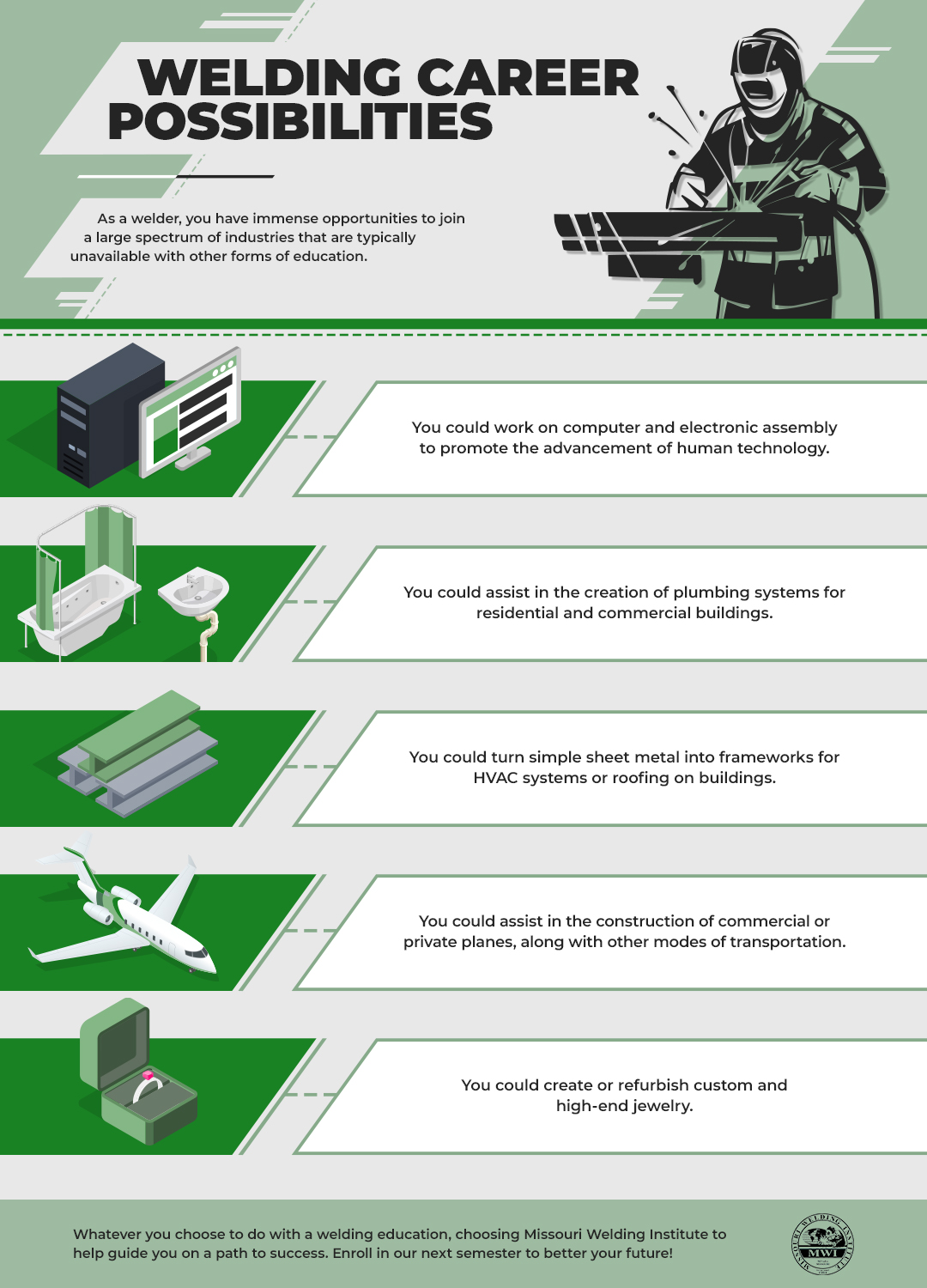The welding industry is a trade that has been around for around 150 years, leading to great inventions, discoveries, and careers that would have been impossible prior to this skill coming to fruition. Because of welding, we enjoy benefits that are often taken advantage of in this day-in-age. This includes our luxury of efficient cars, easy-going plane rides, and even the support of desks for our household items and computers. Without the invention and implementation of welding into our everyday lives, who knows how much more difficult our effortless routines would be. Thankfully, due to education facilities such as the Missouri Welding Institute, we have trained professionals that alleviate our worries for the sustainable and important trade of professional welding. If you have ever considered welding as a potential career outlet, or you are interested in learning what kind of opportunities it could bring you and your family, we encourage you to read on to learn more about this important foundational skill.

High School, Check — Now What?
While many individuals pursue a higher education at a traditional university or post-high school facility upon graduating from high school, they are often blindly following a passion that they think they might have one day. This leads to numerous major switches, increased delay in entering the workforce, and plenty of accumulated debt and stress that can leave them drained before they even make it into the “real world.”
By the time you are finishing high school, hopefully, you gain somewhat of a grasp at what you like to do or the type of learner you are. If you love to work with your hands, like to create, take pride in the projects you start and aim to always do your best at whatever job is assigned to you, a career in welding could be in your future.
What Can Welding Do For Me?
Welding, like all other forms of post-high school education, can and will positively impact the lives of you and the loved ones in your immediate life. One of the differences between learning welding as opposed to pursuing a degree in a 4-year institution is the immediate opportunities that present themselves to you. While many people who go to traditional universities find themselves in an entry-level job that has little or nothing to do with their degree or passion, a welding background will help immediately thrust you into the career field and passion that you have worked hard to achieve. Yes, this often can be entry-level or require assistance from a more experienced welder, but it is at least an immediate step in the right direction, as opposed to working in an unrelated field post-college.
Career Opportunities Through Welding
Upon receiving your education at an accredited welding institution, you will be presented with various opportunities and career paths in which this welding knowledge can take you. A lot of these career paths will be even more attainable with specific education experience in various paths, which are covered and potentially taught in-depth at your welding institute, depending on which courses you decide to follow throughout the education experience. Here are some of the potential career paths that can be pursued with a full welding education.
Assembler/Fabricator:
Applying the finishing touches onto consumer goods is the name of the game for this welding career path. Your welding skills will be tested on both a macro and microscopic level as you weld together pieces of toys, electronics, and sturdy consumer products. This career path is also used to help reinforce and strengthen our modes of transportation. As an assembler, you may find yourself constructing airplanes, ships, boats, trains, and cars that assist in our necessary transportation.
Machinist, Tool, or Die Maker:
As a machinist welder, you will work on pieces of machinery and tools that assist in the production of transportation or construction resources. As a machinist or tool welder, you may find yourself working weekends or nights to comply with the strict timeline that these large corporations have for you and your crew. The timelines are generally strict and inflexible because you will need to complete the steps required to get these items ready for the hiring company so that they can then fully complete their own tasks. While this career path can come with irregular hours and higher stress levels, the individuals who are up for the challenge will receive great monetary benefits.
Sheet Metal Worker:
As a sheet metal worker, your job will be to weld sheets of metal together to create a final product. These products often include AC units and the piping that goes into ventilation systems. Sheet metal will get heavier the more that is welded together, and the products will become larger over time. Sheet metal welders will routinely perform heavy lifting of these large, finished pieces, so if you are up for a physically demanding job that serves a greater purpose, this career path may be for you.
Plumber, Pipefitter, and Steamfitter:
As a part of the construction industry, these welders help build projects from the ground up to assist in the functional operations of residential and commercial buildings. The main job is to construct these various pipe fittings, and then make sure that the building is following specific codes set forth by local and federal government. This career requires traveling to one or more sites that construction is currently taking place in. This is also a job that requires timelines because without the proper foundation and plumbing set forth, the building will not be able to move onto the next phase of construction.
Boilermakers:
This career path involves producing steel fabrications such as plates and tubes. Originally used for the creation of boilers, there is now a wider spectrum of applications for these metal forms. This can include bridges, blast makers, and mining equipment. This job requires considerable amounts of travel, so if you tend to be the explorative type, this could be a rewarding experience for you.
Metal and Plastic Machine Workers:
Metal and plastic machine workers set up and operate machines that cut, shape, and produce both metal and plastic pieces used in constructing a variety of goods for our modern society. There are a lot of safety requirements for this job and the products it produces, so if you are a meticulous and thorough worker, this might be a great route to go.
Jeweler, Precious Stone, and Metal Workers:
Most welders in this category of professionals spend their time repairing specific pieces of jewelry and collectibles to get them to the condition they are supposed to be in. Most of this jewelry that is worked on is high-end and expensive, meaning that the welder will need to be careful to preserve the integrity of the jewelry without sacrificing quality. Restoring jewelry is a meticulous and time-consuming process, but the results are both beautiful and rewarding as the consumer will appreciate all of the hard work done and they will be able to continue to enjoy the jewelry that needed refurbishing in the first place.
Continuing Education with Missouri Welding Institute
As you can see, the welding industry is not a one-goal oriented job. Just like any other industry, there are preferred choices and economic value based on certain characteristics and desires that are signaled by individuals who pass by. For a preferred education experience, be sure to contact Missouri Welding Institute for friendly assistance as well as dedicated experience and inspiration. We hope to hear from you soon!
